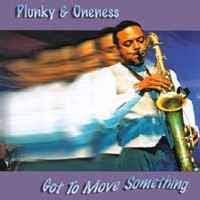
Daily Dose Of Jazz…
James “Plunky” Branch was born on July 20, 1947 in Richmond, Virginia and educated in the city’s segregated schools. He then attended Columbia University in New York City, but by 1971 he had moved to San Francisco, California. It was here that he formed Juju, a musical group that combined rhythm and blues, jazz, soul, and African musical influences.
He founded the band Plunky & Oneness, which began as Juju in 1971 which he renamed twice, Oneness of Juju and Plunky & the Oneness of Juju, before it was given its current name in 1988. One of Plunky & Oneness’ songs, Every Way But Loose, is featured on the video game Grand Theft Auto: Vice City Stories, playing on fictional radio station Paradise FM.
Branch is the president and founder of the independent record label N.A.M.E. Brand Records, through which he has released 25 albums. As a studio musician Plunky has worked for The Cosby Show and has appeared on several avant-garde jazz albums.
As an educator he has been Director of the Jazz Ensemble at Virginia Union University as well as an instructor of Afro-American Music History at Virginia Commonwealth University.
He has been the recipient of two NEA Jazz Fellowships and was appointed to the Governor’s Task Force for the Promotion of the Arts in Virginia. In 1999 he was recognized by Richmond Magazine as Musician of the Year for 1999. J. Plunky Branch continues to perform, record, compose and produce.
More Posts: bandleader,educator,history,instrumental,jazz,music,producer,saxophone,songwriter
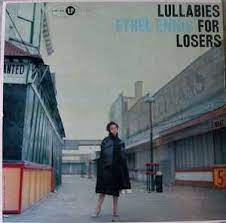
The Quarantined Jazz Voyager
This Jazz Voyager is still being very cautious about masking indoors and social distancing as the new B variants are cropping up around the world and are now hitting the shores of America. In light of these occurrences, today we are going to listen to the 1955 Ethel Ennis album recorded titled Lullabies For Losers that was released the same year on the Jubilee record label.
The cover was designed by Si Leichman, the liner notes were written by Mort Goode, and the photography by Charles Varon.
Track List | 37:32
- Love For Sale (Cole Porter) ~ 3:19
- Dreamer~Dreamer (Irving Caesar, Oskar Strauss) ~ 4:30
- Blue Prelude (Gordon Jenkins, Joe Bishop) ~ 3:00
- Off Shore (Leo Diamond, Michael H. Goldsen) ~ 3:55
- Casually (Alan McCarthy, Richard Freitas) ~ 3:57
- Hey Jacques (Eden Ahnez, Wayne Shanklin) ~ 3:03
- Lullaby For Losers (Robert Stringer) ~ 3:00
- Say It Ain’t So, Joe (Al Frisch, Kathleen G. Twomey, Fred Wise) ~ 2:58
- You Better Go Now (Bickley Reichner / Robert Graham) ~ 3:29
- Blue Willow (Vic Harrington) ~ 3:23
- Bon Voyage (DeSylva-Brown-Henderson) ~ 4:18
- Ethel Ennis ~ Vocal
- Hank Jones ~ Piano
- Eddie Biggs ~ Guitar
- Abie Baker ~ Double Bass
- Kenny Clarke ~ Drums
More Posts: adventure,album,club,festival,genius,jazz,museum,music,preserving,restaurant,travel,vocal
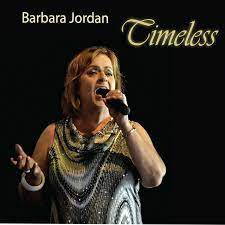
Daily Dose Of Jazz…
Barbara Jordan was born on July 13, 1951 in Montreal, Canada and when she was in her last year of high school she realized her singing ability. Her high school music teacher, Iwan Edwards, encouraged her to audition for the lead role of Laurie in the musical Oklahoma. Getting the part she received her first lessons in stage presence and delivering a song. She joined the high school choir, and took a vocal music class in her last year of high school.
Joining an acapella choir outside of school, she also spent five years in this choir performing around Montreal and touring Western Canada and competed in the Eisteddfod in Wales. Her professional musical career began as a folk singer prior to becoming a multi-lingual vocalist with several leading disco, pop and country/western bands in and around the Montreal area.
Settling in Toronto, Canada she has acquired a reputation over the years singing traditional and swing. She has continuously performed in clubs around the Toronto area, New York, and New Orleans, as well as at various jazz festivals in Ontario, Montana, St. Petersburg and Sarasota, Florida; Newcastle, England and Paris, France.
Trad jazz, dixieland and swing vocalist Barbara Jordan, whose influences were Mildred Bailey, Peggy Lee and Lee Wiley, continues to lead her quartet and appear regularly.
More Posts: bandleader,history,instrumental,jazz,music,vocal
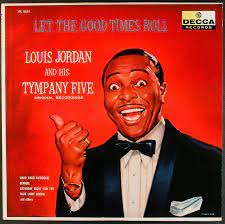
Daily Dose Of Jazz…
Louis Thomas Jordan was born on July 8, 1908 in Brinkley, Arkansas. His father, James Aaron Jordan, was a music teacher and bandleader for the Brinkley Brass Band and the Rabbit Foot Minstrels. His mother died when he was young and his grandmother Maggie Jordan and his aunt Lizzie Reid raised him. At an early age he studied clarinet and saxophone with his father and by his teens he was a member of the Rabbit Foot Minstrels and was playing professionally in the late 1920s.
In the early Thirties he was performing in Philadelphia, Pennsylvania and New York City with Charlie Gaines. He recorded with Clarence Williams and was a brief member of the Stuff Smith Orchestra. Joining the Chick Webb Orchestra he sang and played alto saxophone, however, in 1938 he started a band that recorded a year later as the Tympany Five.
In 1942, Jordan and his band moved to Los Angeles, California where he began making soundies, the precursors of music video. He appeared on many Jubilee radio shows and a series of programs for the Armed Forces Radio for distribution to American troops overseas. Though a hernia condition kept him out of the war his recordings made him very popular with both black and white soldiers.
During the 1940s Jordan and the band became popular with such hits as Choo Choo Ch’Boogie, Knock Me a Kiss, Is You Is or Is You Ain’t My Baby, and Five Guys Named Moe. Within a year of his breakthrough, the Tympany Five’s appearance fee rose from $350 to $2,000 per night. But the breadth of Jordan’s success and the size of his combo had larger implications for the music industry. His raucous recordings were notable for the use of fantastical narrative, best exemplified on Saturday Night Fish Fry, a two-part 1950 hit that was split across both sides of a 78-rpm record. It was one of the first popular songs to use the word “rocking” in the chorus and to feature a distorted electric guitar.
From July 1946 through May 1947, Jordan had five consecutive number one songs, holding the top slot for 44 consecutive weeks. In 1961, the IRS filed an income tax lien against Jordan and he had to sell property well below its value to pay off his debts. Musician Ike Turner stepped in and contacted and convinced the president of Jordan’s booking agency in Chicago, Illinois. to send Jordan a check for $20,000. He was unaware of this deed.
Over his career he charted dozens of singles, eighteen #1 and fifty-four in the Top Ten. He ranked fifth among the most successful musicians of the period 1942~1995, however, many he did not own the rights to, hence no financial benefit. Saxophonist, multi~instrumentalist, songwriter and bandleader Louis Jordan suffered a heart attack and transitioned on February 4, 1975, in Los Angeles.
More Posts: bandleader,history,instrumental,jazz,music,saxophone,songwriter
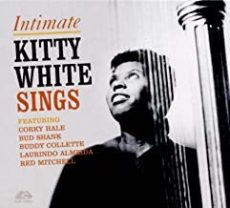
Daily Dose Of Jazz…
Kitty White was born Kitty Jean Bilbrew on July 7, 1923 in Los Angeles, California. Raised in a musical family, her parents were singers, and her uncle was a well-known vaudevillian and disc jockey. Her twin sister, Maudie Jeanette, also sang and briefly worked with Duke Ellington’s revue, Jump for Joy, but never pursued an active career. Their mother, known as A.C. Bilbrew, organized an all-black chorus that performed in the 1929 film Hearts of Dixie.
She started her career at the age of sixteen as a singer and a pianist, appearing in local nightclubs around Los Angeles. Branching out she opened at the Black Orchid in Chicago, Illinois and was introduced to the executives of Mercury Records, where she became a recording artist.
Kitty picked up her catchy jazz name legitimately by marrying songwriter Eddie White in the 1940s. She moved to Palm Springs, California in 1967 and sang at the Spa Hotel for sixteen years.
Recording mostly on the West Coast, she worked with Buddy Collette, Gerald Wiggins, Chico Hamilton, Bud Shank and Red Callender. She sang many demo recordings for her friend, Los Angeles blues composer Jessie Mae Robinson, including I Went To Your Wedding, a No. 1 hit for Patti Page in 1953. She was also the sole female voice on Elvis Presley’s song Crawfish from the King Creole film soundtrack.
Vocalist Kitty White, who recorded eight albums as a leader and had two compilations released, transitioned in Palm Springs, at the age of 86 on August 11, 2009 after suffering a stroke.
More Posts: bandleader,history,instrumental,jazz,music,vocal



